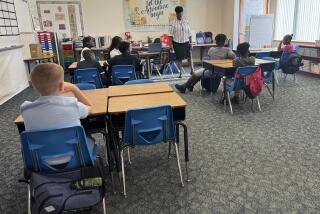Capital’s Cash Crunch Squeezes Washington Schools
- Share via
WASHINGTON — Teachers in this cash-strapped city must buy their own chalk and paper while students study from decades-old books and in ill-equipped libraries.
In the capital of one of the world’s richest nations, public schools are just one more headache for officials scrambling to recover from an accumulated deficit of $378.5 million.
In 1991, city schools had a budget of $512 million. Five years later, it was down to $491 million.
For this school year, the Board of Education voted to cut $34 million by closing six schools, eliminating summer school and teachers’ aides and freezing the number of substitute teachers.
Board members said the cuts come at a time when many school buildings--some more than 100 years old--desperately need renovation.
Even more of a problem is the fact that about half of the city’s 116,000 schoolchildren are from families receiving public assistance.
At a recent City Council budget hearing, school board president Karen Shook said the city has “failed our children and our public education system.”
House Speaker Newt Gingrich (R-Ga.) told a national meeting of the Parent-Teacher Assn. that District of Columbia schools are “a disgrace to this country.”
“We are cheating the children of Washington, D.C., every day,” he said. “We put them in buildings that are terrible, surrounded by a bureaucracy that doesn’t care with a central office that ought to be abolished.”
Taft Junior High in northeast Washington is one school that incites such rhetoric.
It can hold 1,700 students but has 332, a testament to the flight of the middle class--black and white--to the suburbs.
The school’s library is closed because much of its ceiling is missing. Water leaks have brought a dank, mildew-like smell to this room and its thousands of dust-covered books.
For teachers, Taft, like several other district schools, is a test of one’s love for education. Many said they spend money from their own pockets each month for paper and copier ink to copy books. Copies are needed because there aren’t enough texts for students to take home for the night.
The books that are available may be 20 years old.
“We care. We try, but believe me, we need funds,” said Thomas Black, a ninth-grade environmental science teacher who has been at Taft for 30 years. “This neighborhood and school have been beautiful. I’m watching it now on its decline.”
School board member Valencia Mohammed, who is staunchly opposed to the budget cuts, said a runaway city government is using innocent children as scapegoats.
“That whole discussion of children come first, that’s a bunch of junk,” she said.
She cites the city’s failure to raise money for the schools by selling nine buildings that were closed three years ago.
City officials counter that the buildings are difficult to sell because neighborhood residents could oppose the rezoning that would be necessary for the schools to be turned into businesses.
Mayor Marion Barry urged critics to be patient and give the city time to deal with its cash shortfall. “We still are going to make it out of this yet,” he said. “We’re going to do all we can to reform our schools, to balance our budget, and not at the expense of our children.”
Education advocates say sooner or later the schools will have to get more money.
“There are no more cuts that can be made without seriously hurting the educational program,” Shook said. “The city’s budget is routinely balanced on the backs of the children.”
More to Read
Sign up for Essential California
The most important California stories and recommendations in your inbox every morning.
You may occasionally receive promotional content from the Los Angeles Times.













